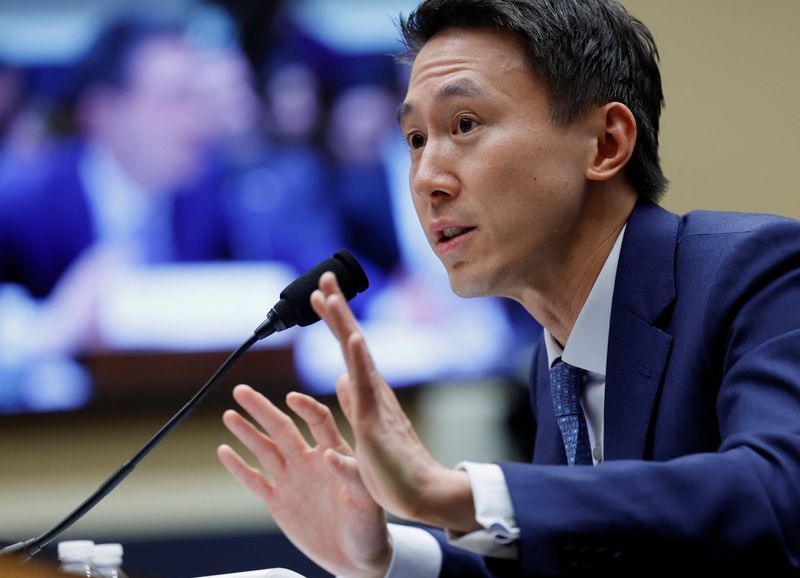Factbox-Why a broad US TikTok ban is unlikely to take effect soon
2023.03.23 18:21

© Reuters. TikTok Chief Executive Shou Zi Chew testifies before a House Energy and Commerce Committee hearing entitled “TikTok: How Congress can Safeguard American Data Privacy and Protect Children from Online Harms,” as lawmakers scrutinize the Chinese-owned video-
(Reuters) – A recent ban of TikTok use on U.S. government-owned devices, coupled with new legislation in Congress seeking to block the app, have fueled expectations the popular Chinese-owned platform could soon be barred nationwide.
Adding to the perception, last week the company said the Biden administration had demanded TikTok’s owners divest their stakes in the popular video app or face a possible ban.
It is unclear how the Biden administration might implement such a ban, if it chose to move forward with a plan, but if history is any guide, a prohibition is unlikely to take effect any time soon. Here is why:
TRUMP
Citing national security concerns, then-President Donald Trump told reporters he planned to ban TikTok in July 2020, threatening to shut it down if it could not be sold by its Chinese owner Bytedance to a U.S. buyer.
In August, he issued two executive orders, one banning the app and another demanding Bytedance sell its U.S. business to U.S. companies.
But Trump’s attempt to block TikTok with an executive order derived its power from the International Emergency Economic Powers Act. That act exempts the import or export of “informational materials,” and “personal communication” through the Berman Amendment, which sought to protect speech.
“Banning the app – or any like it – would likely still be challenged under the First Amendment. It’s important to keep in mind the Berman Amendment under IEEPA is a proxy for the First Amendment. Even if it’s sidestepped, greater legal questions remain,” said John Costello, who oversaw the creation of the office at the Commerce Department to examine certain foreign technology for national security threats.
Meanwhile, the executive order forcing a divestment remains mired in negotiations between TikTok and the Biden administration over a potential national security agreement that could resolve the concerns prompting the ordered sale.
HOW A BILL BECOMES A LAW
Washington lawmakers have also launched two separate bills aimed at allowing the president to ban apps like TikTok on grounds they pose a risk to U.S. national security. But the bills, one in the House of Representatives and the other in the Senate, still need companion bills in the other chamber, as well as enough support to pass both houses and then President Joe Biden’s signature. The White House supports the Senate bill, known as the RESTRICT Act.
Considered the most likely to succeed, the Act would still likely take at least several months before it could garner enough support for a successful vote and the president’s signature. It could also be weakened before it reaches Biden.
Even if the RESTRICT Act is passed this year, the Commerce Department has up to six months to begin reviewing transactions with the new authorities, and up to six additional months to complete the reviews and take action.
TIKTOK’S DAY IN COURT
TikTok is likely to challenge any attempt to ban the app. The company was ultimately successful in quashing Trump’s effort to ban the app in the U.S.
“The First Amendment protects Americans’ right to access social media platforms of their choice,” said Jameel Jaffer, the executive director of the Knight First Amendment Institute at Columbia University. “To justify a TikTok ban, the government would have to demonstrate that privacy and security concerns can’t be addressed in narrower ways. The government hasn’t demonstrated this, and we doubt it could. Restricting access to a speech platform that is used by millions of Americans every day would set a dangerous precedent for regulating our digital public sphere more broadly,”








